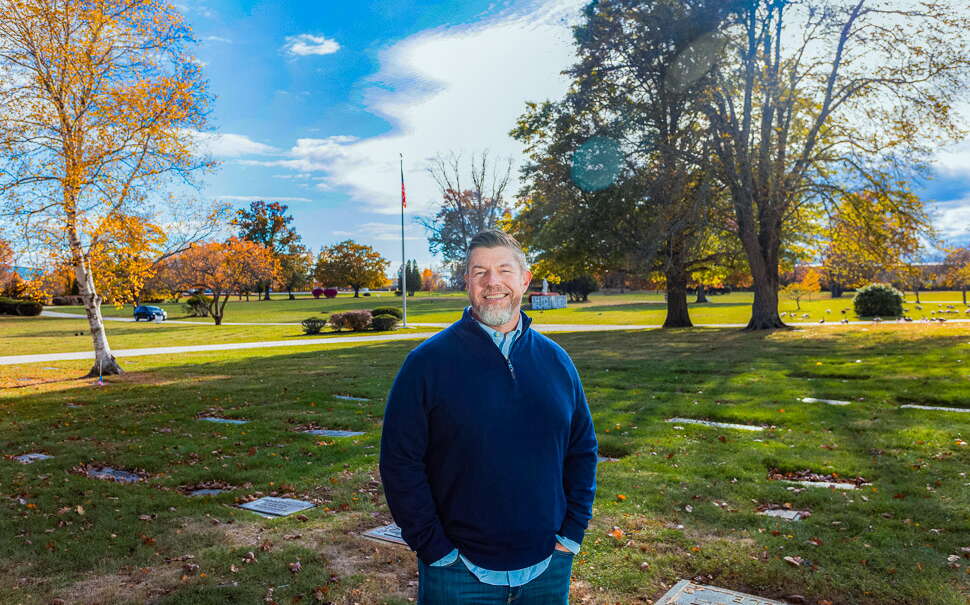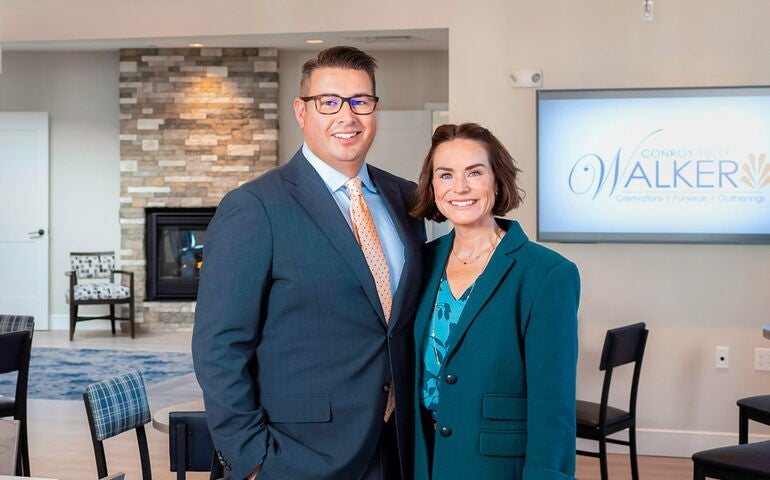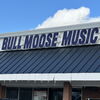
New life for funeral homes: Disruption comes to traditionally staid industry
 Photo / Tim Greenway
Adam and Caitlin Walker, of Conroy-Tully Walker, at the company’s new space in Portland’s North Deering neighborhood.
Photo / Tim Greenway
Adam and Caitlin Walker, of Conroy-Tully Walker, at the company’s new space in Portland’s North Deering neighborhood.
From illuminated metal chandeliers to tables and chairs in muted grays and browns, this light and airy space feels more like a hotel or wedding venue waiting for the right occasion. But the $3.6 million building in Portland’s North Deering neighborhood is neither — it’s the new home of a family-owned funeral business called Conroy-Tully Walker.
“We sound more like a law firm,” says Adam Walker. He and his wife, Caitlin, bought the business in 2014, adding their surname to those of the in-laws who started the business in 1959. The couple did the same in 2020 when they bought a Springvale operation they rebranded as Black-Heald Walker.
“The families who establish those businesses, they put their blood, sweat and tears into those communities to serve those people, to help those families, so I felt it’s important to honor that heritage,” Adam Walker says. “We’re all family-owned funeral homes that come together to serve people.”
The 38-year-old has worked in the profession since 2002, while his wife joined later, after a career teaching children with behavioral disabilities. Sitting near vintage photos that pay homage to Conroy-Tully Walker’s roots in Portland’s West End, Walker says that much of the industry clings to a 1950s model of somber, traditional funerals. But the flexible, multi-purpose venue equipped with screens for livestreaming services and other amenities will “accommodate families where they are now,” he says. The lower-level preparation room, designed with employee safety in mind, is as pristine as the public areas.
Like Conroy-Tully Walker, the vast majority of funeral businesses in Maine are family-owned, including some that go back several generations. Economic pressures, changing customer preferences and new technologies are reshaping the industry. While some owners are adamant about keeping the business in the family while pursuing expansions and new business models, selling to an outside buyer is also an option in a highly fragmented industry that’s attracting strategic and financial investors alike.
Industry’s birth and rebirth
The modern American funeral industry dates back to the Civil War, when embalming became a common practice. For many Americans, seeing the preserved body of the murdered President Abraham Lincoln during a two-week procession from Washington, D.C., to his final resting place in Springfield, Ill., “left quite an impression,” according to a Library of Congress blog post. It goes on to say that when undertakers formed the National Funeral Directors Association in 1882, the death-care industry was born. Today, the Brookfield, Wisc.-based trade group represents 20,000 individual members from more than 40 countries.
Out of more than 15,000 funeral homes nationwide, 85% are family- or privately owned, according to September data from the group. With a 105,000-strong workforce, funeral homes generate $16.3 billion in revenue, while crematories and cemeteries generate $4.3 billion. Market estimates differ. GrandView Research, a San Francisco-based market research and consulting firm, values the U.S. funeral homes market at $13 billion and forecasts 6% compound annual growth over the next five years, pointing to a higher death rate as a natural byproduct of the country’s aging population. Researchers also note growing demand for unique, customized memorials and sustainable burial options from biodegradable urns to natural materials.
Cremation, which costs about $2,000 less than a full-service funeral, is also a growing trend.
‘Passionate about grief work’
In Maine, 87 funeral homes employ nearly 500 people and generate revenue of around $68 million, according to the National Funeral Directors Association. The state’s 29 cemeteries and crematories generate $5.6 million in revenue.
While the 24/7, emotionally and physically demanding profession isn’t for everyone, those in the business frequently speak of a “calling” and service to families at their darkest times.
For Michael Hall in midcoast Maine, the calling came decades after his parents bought the Flanders Funeral Home in Waldoboro in 1958 and reopened it as Hall Funeral Home. After attending college out of state and working in the computer industry before deciding corporate life wasn’t for him, Hall rejoined the family business, buying it in 1992 and running it ever since. He splits his time between locations in Waldoboro, Boothbay and Thomaston, where the family opened a crematory in 2021.
Looking back on his childhood when the family lived in the funeral home, Hall remembers a tight-knit community where the “door was always open,” and handing candy to hundreds of trick-or-treaters at Halloween. Years later at a Halloween party in college, Hall had a delayed meltdown over his mother’s sudden death when he was 10 that he had long “tucked away” – a cathartic experience he now channels into helping others.
“Grief is work,” he says, “but I’m passionate about grief work.” Many times, that work entails comforting people who have never dealt with a loss and finding ways to honor their loved ones, be it in traditional ceremonies or more informal remembrances. One service, held at a community center with a lot of summer memories where the deceased had coached tennis, was the “perfect place for it,” says Hall.
As he thinks about succession planning, Hall says he would never force his daughter who recently graduated from college to take over unless she wants to. Otherwise, he’d prefer to pass the torch to another family with similar values as he fends off occasional approaches from potential suitors.
Walker feels the same way, even if his three young children end up choosing different paths as adults. He also underscores that while financials are important for any family business, they don’t drive the mission of taking care of families.
“If we do our job, the business will take care of itself,” he says.
Ownership by acquisition
Not all funeral home owners come into the business through family succession. Take Michael Martel and Timothy “TJ” Smart, two longtime funeral directors who founded Milestone Funeral Partners in 2021.
The Auburn-based business owns 78 funeral homes across New York, Connecticut, Massachusetts, Rhode Island, New Hampshire and Vermont. It’s also about to expand in its own backyard with the acquisition of five locations in Maine due to be finalized later this month.
Through a separate business called Milestone Cemetery and Crematory LLC, they own Brooklawn Memorial Park & Crematory near the Portland International Jetport and Auburn’s Gracelawn Memorial Park — which established Maine’s first crematory in 1950 and its first mausoleum a decade later.
Martel, who grew up in Lewiston, started in the profession doing part-time janitorial work as a teenager at a local church helping clean up after funerals before taking a job at a local French Catholic funeral home.
“They bought me my first suit and taught me the ways of working with people,” Martel recalls. “By the time I graduated from high school, that’s what I wanted to do.”

He and his business partner, who grew up in Old Town, both worked for Service Corporation International, a large national strategic acquirer based in Houston, before starting on their own. Today, Milestone Funeral Partners has 39 equity owners, including more than 30 licensed funeral directors across seven states and two private equity backers – Bender Equity of Ridgewood, N.J., and Dallas-based Rosewood Private Investors.
When Milestone makes an acquisition, it leaves the running of the business to the sellers.
“We always have majority ownership, but the sellers have the opportunity to roll some of their equity into the Milestone organization, so they can in fact be partners,” Martel explains. “We never want our professionals to look back and say, ‘I hate the fact that I’m only a manager.’”
Touting its decentralized, low-overhead approach, Milestone underscores that hometown relationships are the real “brand” that matters. In most cases, those in the market to sell find Milestone rather than the other way around, according to Martel.
“We’re not for everyone,” he says, “but the owners who choose to partner with us have a pa ositive experience and usually refer their colleagues to call on us as well.”
Local alliance and regional growth
Seeking to expand its range of services, Milestone recently joined forces with Mainely Urns, a New Gloucester-based manufacture of cremation urns and memorial products.

The partnership cements a longstanding relationship between the two companies, by shifting the focus from selling merchandise to helping bereaved families create tributes via Mainely Urns’ “Urnspiration” brand of personalized urns, printed Lookbooks and QR code-linked galleries.
“It’s an alliance of like-minded Maine death-care business operators, focused on unique personalization opportunities for bereaved families,” Martel says.
As for Milestone’s long-term plans, Martel says that the goal is to keep growing in this part of the country and build on existing clusters.
“That probably means acquiring 10 to 15 firms a year,” he says. “We could comfortably do that for a really long time and build a nice strong business here in the Northeast.”
Investors of different stripes
Milestone Funeral Partners is a small player compared to large national strategic buyers like NYSE-listed Service Corporation International, which owns 1,900 locations in 44 states and eight Canadian provinces. Its holdings in Maine include funeral homes in Lewiston, Auburn, Lisbon Falls, Portland, Rumford and Yarmouth — though they don’t necessarily include the corporate name in their branding.
Private equity firms are also digging in, from the funeral-focused Foundation Partners Group to middle-market generalists. Industry iniders expect dealmaking to pick up.
“The amount of firms raising their hand and looking to sell their business has increased quite a bit over the last 12 to 18 months,” says Chris Cruger, CEO of Foresight Cos. LLC, a Florida-based consulting and succession planning firm for funeral and cemetery businesses.
Cruger attributes industry consolidation to a number of factors, starting with aging owners approaching retirement. That’s documented in a 2023 National Funeral Directors Association survey of 239 owners, half of whom said they plan to retire within the next five years.
A “very aggressive” shift to the use of technology in all aspects of the business — including marketing, case management and different ways to memorialize someone during and after a funeral service is also fueling consolidation, Cruger says.
“This profession has been slow to change, so in some cases it means people just saying, ‘the heck with it, get me out,’” he says. While the industry was forced to get “somewhat” current during the pandemic when livestreaming took off because of restrictions on large gatherings, “it’s getting there kicking and screaming.”
In more than half of the 182 deals his firm has advised on over the last six and a half years — with an average exit of $7 million to $8 million — the asset did not go to the highest bidder.
“That is a badge of honor,” he says, because it’s not all about financial returns. “The money is extremely important, but it comes down to finding who will be the right buyer to continue to serve the community and honor the legacy of that business.”
Back at Conroy-Tully Walker in Portland, Adam Walker remains determined about staying independent despite regular queries from Texan behemoth SCI and private equity firms.
When those calls come in, “we tell them that we’re proud to be family-owned and we intend to remain family-owned,” he says.










0 Comments